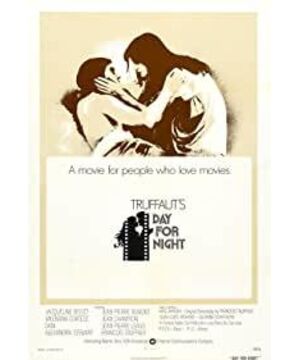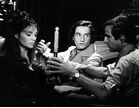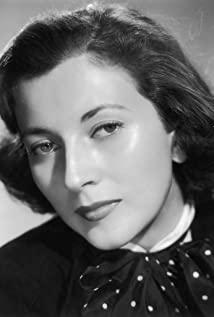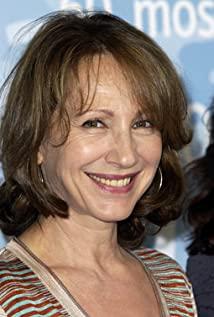"Life is more painful than a movie, and you belong to a movie" - Day for night after watching it, it is also translated as a play within a play. The former refers to a film shooting technique that uses filter light during the day. The night scene of the movie is shot by the mirror, and the latter is the direct positioning of the content of the movie. Day and night is a part of this film, and of course it also reflects the core problem: making a film is not easy, strictly speaking, it is a play within a play, and the filming process is short of time and funds. The crew and actors are also tight. The situation is full of circumstances, and the director made this film really hard. This feature cannot be universally included in any film, and it cannot be easily relied on as a basis for us not to arbitrarily give a bad review to a film. The film director also participated in the performance of this film, and is the director in the play. The lines in the picture below are exactly the director's comfort to the actors in the play. This kind of enlightenment is novel, and uses pessimistic facts to motivate the actors to complete the performance. Why reject beautiful things and sink into the misfortunes of reality? This is actually a true portrayal of the director's heart outside the theater. All the characters in the play, the performance is natural and real, there is no exaggerated sculpture, and it is close to the simplicity of a documentary. I now like this kind of shooting techniques and realistic life themes.
——The play within the play "Pamela"——
It's a movie about infidelity. At the beginning of the filming of the play, the three leading actors expounded their understanding of the play "Pamela" from their own perspectives. An old man fell in love with his daughter-in-law. A young man whose wife has a crush on his father. An English girl falls in love with her husband's father. The names of the characters in the play (Pamela) directly use the names of the characters (except the heroine) in the play (day to night), you may think this is too casual, and it will confuse the actor's audio-visual, but it is just like reading a book In the same way, too many names will cause the reader's memory burden. The name is just a code name, and the soul has long been marked. (Some of the lines in Pamela are also directly copied from the actors' words off-screen.) Pamela's shooting is intermittent and tight. There are also fewer characters in the play, and only 150 ensembles will appear in the scene in that part of the square. However, only four people are the highlight of the movie, and it is not easy to control when shooting, and each actor's acting skills are limited by their real life. On the contrary, it is the picture with many people in the square, which will be more handy to shoot. It is also the first time that I know that the director wants to control the overall situation of the whole world. The lady walking the dog on the roadside has to speed up the pace. The crowd in the subway has to be natural and real, and even when the male protagonist takes out his pistol, The poses follow the director's instructions. A good movie is the release of the director's unique and profound understanding of the movie. The music in the play should be considered the smoothest part, without NG passing directly. Some of the things that a movie needs to be studied are trace elements in daily life, and all the components are indispensable. A good movie can have no soundtrack, and if there is a soundtrack, it's definitely high-quality music, and there's absolutely nothing wrong with that. The music in the play is when Pamela falls in love with her husband's father at the ball. In less than a minute, I bought a book dedicated to the music in the movie. I don't know much about the rhythm, but the music here is pleasant. Good music, it resonates widely, it's not a distinction between elegance and vulgarity (the soundtrack to The Romance of Dying is not bad). The language, French is nice, but you laugh without reading the subtitles, and the murmur of a string of syllables is like a tongue stretching, which is also the music part. The plot of the play within the play is the statement of the three protagonists, and the development of the plot is presented on the scene of the filming, as well as in the raw film. I think it's just a normal movie. ——Day For Night—— The most important part of this play is of course the filming process of Pamela. At the beginning of the film, it was reflected that there were many problems with the filming time, funding, actors, and staff of the play. Everything at the moment is like a temporary gathering. Catherine also said when she said goodbye to the crew: Everyone gets together and goes their separate ways, and everything is fleeting. The lively and noisy atmosphere is the unstoppable prosperity. The director shuttles back and forth on the set. This film will not be superficial enough to justify the filmmakers. The birth of a work is a combination of the efforts of many people. When the director expresses his own understanding of making a movie, it is a misunderstanding: it is simply the most hypocritical complaint. In the film, there is the director's love for the film industry, Joel's dedication to the film, and the dedication of the heroine Julie... There are also many positions, location, props group, photographer, editor, stuntman, scene recorder, producer , Composer... In my opinion, people who really love the film industry, who hide their passion in their hearts, do not express their performance deliberately, and try their best to be loyal to their duties are already respected. Introduce the movie characters: 1---The heroine Julie, a Hollywood actress (playing Pamela in Pamela), her biological mother is also a Hollywood actress. Suffering from depression due to filming, she later married a doctor. The depression has not been completely cured, and her condition is unstable. The insurance company refused to give her insurance (because there are too many uncontrollable factors in the filming process, those who can participate in the insurance will do their best to ensure the smooth shooting of the film). 2---The male protagonist Alexander, who is also a Hollywood actor, can be regarded as Julie's predecessor and worked with his mother (Alexander played Pamela's father-in-law in Pamela). In a conversation, he said that he had many ways to die during filming, but there was no natural way to die, and death might not be natural. I speculate that he probably had a bad career and didn't become a superstar. Even a passing star, he's still as cute as Katherine, with a wrinkle on his face that says "Happy and happy". In fact, before his role was completed, Alexander practiced the unnatural death he said in practice. He was unfortunately in a car accident on the way back from the airport to the studio and died without rescue. 3---The second male, Evans, plays Pamela's husband. It is a young actor who has acting skills and is recognized by the director. Evans's selfishness and naivety in love is reflected in the lack of greedy possessiveness and sense of security. Love was once regarded as a necessity for survival. His love life was not going well, and he asked his male colleagues on the set, "Are women magical animals?" I think it is easier to answer this question by asking female colleagues. Introduce the movie characters: 1---The heroine Julie, a Hollywood actress (playing Pamela in Pamela), her biological mother is also a Hollywood actress. Suffering from depression due to filming, she later married a doctor. The depression has not been completely cured, and her condition is unstable. The insurance company refused to give her insurance (because there are too many uncontrollable factors in the filming process, those who can participate in the insurance will do their best to ensure the smooth shooting of the film). 2---The male protagonist Alexander, who is also a Hollywood actor, can be regarded as Julie's predecessor and worked with his mother (Alexander played Pamela's father-in-law in Pamela). In a conversation, he said that he had many ways to die during filming, but there was no natural way to die, and death might not be natural. I speculate that he probably had a bad career and didn't become a superstar. Even a passing star, he's still as cute as Katherine, with a wrinkle on his face that says "Happy and happy". In fact, before his role was completed, Alexander practiced the unnatural death he said in practice. He was unfortunately in a car accident on the way back from the airport to the studio and died without rescue. 3---The second male, Evans, plays Pamela's husband. It is a young actor who has acting skills and is recognized by the director. Evans's selfishness and naivety in love is reflected in the lack of greedy possessiveness and sense of security. Love was once regarded as a necessity for survival. His love life was not going well, and he asked his male colleagues on the set, "Are women magical animals?" I think it is easier to answer this question by asking female colleagues.
4---Female No. 2, Katherine, who had been in Hollywood. He was in a relationship with Alexander when he was young, and they stopped working together on stage for four years after the breakup. She is also an outdated middle-aged actress who resists aging and at the same time admires and even envys the beauty of young actresses. This envy is a harsh pursuit of beauty. Because her son is ill and critically ill, the pressure is extremely high. The way to relieve the pressure is alcohol. Alcohol erodes her memory. Fortunately, her acting skills are not bad. #Pamela is a movie, day and night is life#
Pamela and day and night, their contradictions form a contrast. Pamela and Alexander's relationship fermented smoothly. The two conspired to run away, romantic and not promiscuous. In real life, Julie's condition is unstable, and depression will recur once stimulated. Her husband was her doctor, and when she was sick, he abandoned his family and came to her to take good care of her. The doctor gave up her family life for 20 years, from which she learned what responsibility was and regained the courage to continue filming, which is what Jolie said (really portrays the man who abandoned his scumbag wife as fresh and refined, but It doesn't matter, the point of the movie is not moralism and marriage). There is no lack of sweetness and respect in this year-end love, which is the sour appearance of love. In the early days of Pamela's filming, Jolie corrected the doctor's name in an interview: she was not married to her own doctor, but to a man who was a doctor. Yes, he is not her appendage, and she is not married, they are equal because of love. At the later stage of the filming of Pamela, the whole filming gradually became smoother in the intensive progress. First, Elphonse's emotional conflict exploded into a gap and blocked the filming. The dedicated Julie devoted herself to appease Elphonse, the love brain of Elphonse. It was the fuse that caused the relationship between Julie and the doctor to break down. He called the doctor to "request" Julie, and then Julie received a call from the doctor and broke down... The trouble before Stacey (playing Alexander's secretary, only Two shots, a period of time in between) is pregnant, and it can be solved by changing the plot slightly by using shooting skills. The unhappiness of the protagonists in reality is even more reflected, and the shooting of this Pamela is so fragile. To make matters worse, Alexander passed away... Pamela's post-shoot clutter, the insurance company's unfavorable advice for the shoot. These are all tricky issues that can mess people up. This is not to echo the lines. Because of this, movies are worth pursuing, in the current words: life is not worth it, but movies are sweet. As for the gap between reality and film, it is a natural existence and not deliberately highlighted. Day and night soundtracks are rare, if Pamela's soundtrack is anything. At other moments, the chaotic sound of the studio, the voice of the director pointing the actors, and the cheerful music rhythm when the film camera appears, the filming process and the smoothness of the film can be reflected by the music rhythm. Without the rendering of music, it did not cause any defects, but made the film more simple. There are some metaphors and hints in the movie. I'm not familiar with the director's creative life and preferences, so I can't make assumptions. I think being able to use metaphors and allusions in a film shows the director's active control over the film. That is, to have control over the movie that meets your own psychological needs, which eliminates the exaggerated commercial atmosphere. When he learned that there was a power outage in the development room and all the pictures of the square that had been filmed were destroyed, the producer complained that only the real estate industry could make money. The director, who has been calm, declared that he made movies because of his love. Therefore, the film avoids unnecessary commercial atmosphere. Immediately afterwards, as the filming came to an end, the dream of the director became more and more restless. From the little boy who just leaned on crutches to the little boy who dragged the crutch and threw the crutch through the iron gate into the "city" inside the iron gate. The boy simply dropped his crutches and tore off the posters pasted inside the iron gate one by one—stealing them. I didn't know it was a movie poster at the time, but then I went back to find the pictures on the paper and the words "Citizen Kane". I don't know if this is the director's love or hatred. Citizen Kane has a high score for this movie, so it can be understood that the director loves this movie and desperately wants to take these precious posters as his own. The pictures on the posters are somewhat similar to Pamela's pictures. , could that be the director paying homage to the film? At the same time, when Pamela's episode was finished, the director and the producer were very satisfied. When he answered the phone and listened to the music, the director put out the books he bought one by one for inspection. These two places are related, right? I need to check the director's preferences again (but I don't want to know too much about laying hens, just watching the movie is enough). In addition, the director wears hearing aids all the time, which corresponds to the fact that he was always on crutches in his dream. The director's love for movies should have been from a young age, and he may have been inspired by an excellent movie. When the film was completely finished, the staff of the props team accepted an interview: the filming went well. No one would dare to draw such a conclusion until the end. There are still many details worth looking into in the film, the neurotic wife on location, the silent romantic relationship in the crew, the creation behind the director's assistant director's assistant, the communication between the producer and Julie, the unknown overloaded hours behind the film , the questions asked by reporters in interviews... Finally, movie lines are always charming, they can resonate with people without being pretentious. When you watch a movie, if you randomly capture a moment, you will feel that you are a photographer, and every picture is beautiful. I just remember the endless waiting during filming.
View more about Day for Night reviews











